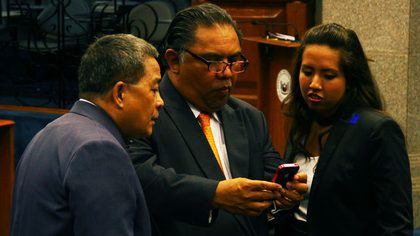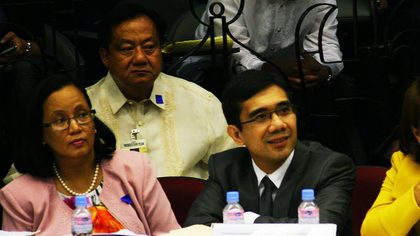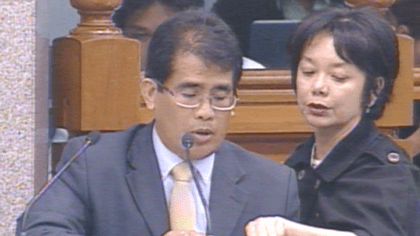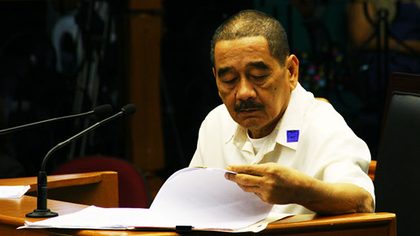SUMMARY
This is AI generated summarization, which may have errors. For context, always refer to the full article.

MANILA, Philippines – The story of Basa-Guidote Enterprises Inc. (BGEI), which has captured national attention through the ongoing Corona impeachment trial, is a complicated one.
What happened behind the scenes raises questions about how Chief Justice Renato Corona and wife Cristina won court verdicts that eventually transferred company ownership to their daughter Carla.
A subject of a decades-old family dispute, Cristina Corona was able to wrest control of the corporation from her Basa relatives through a series of curious court victories that culminated in 2003.
Unknown to the Basas, a court order led to the public auction of BGEI’s majority shares to pay for the civil indemnity of P500,000 that the same court awarded Cristina for “libelous” newspaper ads that the Basas published against her in 1995 (see a sample of the ads above).
Cristina’s daughter Carla Corona Castillo happened to be the lone bidder for 4,839 shares representing 91% of BGEI. These are the total shares of Cristina’s aunts and uncles, which they entrusted to Jose Maria Basa III, one of the respondents in the libel cases.
For a meager bid of P28,000, Carla became the controlling owner of BGEI. The bid is a far cry from what her mother was supposed to get for winning the libel case.
On Day 36 of the Corona impeachment trial, Presiding Officer Juan Ponce Enrile noticed the disparity. “You’re talking here of 4,839 shares. That means you have P483,900 worth of shares at par value (P100 per share). And given the value of the property at the time of the sale, which was sold at P34.7 million, the fair value of the share is a lot, lot, lot, lot more than the par value,” Enrile said.
Enrile was referring to the BGEI lot that the Manila City Hall purchased in 2001 for P34.7-M. This is what the family dispute had always been about: a 1,020-square meter lot on Legarda Street in Sampaloc. Before Cristina sold it to Manila City Hall in 2001, the lot had a dilapidated building that was rented out to a few tenants.
Defense spokesperson Karen Jimeno maintained that there is nothing unusual in Carla’s low bid for BGEI. “It’s a closed family corporation. It was received [by Cristina] because they are related,” she said.
Death and criminal case
Jose Maria Basa III died in August 2002, while the court was hearing his motion to reconsider the libel conviction. According to the prosecution, the death should have extinguished the criminal case.
Jose Maria is the uncle of Mrs Cristina Corona, wife of Chief Justice Renato Corona, and the father of Ana Basa, who recently came out in the media to accuse the Corona couple of using the Chief Justice’s position to harass them.
Jose Maria, Sister Flor Maria Basa, and Cristina’s mother Asuncion Basa-Roco are siblings.
The defense panel presented witnesses former Manila Mayor Lito Atienza, Quezon City RTC branch 216 clerk of court Lucita Cristi and court sheriff Joseph Bisnar to testify that: 1) BGEI has an asset worth P34.7 million, and 2) BGEI is now owned by Carla Castillo.
But the prosecution panel came well prepared, raising various irregularities in the court rulings that allowed the Coronas to ease out the Basas from BGEI.
“Is it material that the main person who was pushing for the execution [of the conviction for libel] was the wife of the Associate Justice of the Supreme Court?” asked prosecution spokesperson Romero “Miro” Quimbo.
CJ’s central defense
But why is BGEI important in the impeachment trial of the Chief Justice? And why did the defense risk exposing alleged irregularities surrounding it?

BGEI had taken a central role in Corona’s defense.
It was first introduced to the impeachment court through Corona’s 2003 Statement of Assets, Liabilities and Net Worth (SALN), where he declared an P11-M loan from the company. It raised questions then because according to the Securities and Exchange Commission (SEC), the corporation was already “dead” as of 2003.
Corona’s defense team took its time to explain BGEI.
After presenting 3 witnesses, however, the story is almost complete.
Former Manila Mayor Lito Atienza testified on the purchase of the BGEI lot in Sampaloc, Manila for P34.7-M. The lot served as a relocation area for market vendors displaced by the construction of a train station.
This money is the source of Corona’s P11-M loan in 2003, which supposedly allowed the Corona couple to buy their lot in the posh La Vista subdivision, Quezon City.
It is the same money that the defense used to justify Corona’s deposits in Philippine Savings Bank (PSBank). The trial disclosed that Corona prematurely closed 3 PSBank peso time deposits totaling P37-M on Dec 12, 2011—the day he was impeached.
The defense said the money belonged to BGEI. It was not declared in his SALN because it was not his money.
The money is still intact because of the ongoing dispute over the corporation, added Jimeno.
The same property in La Vista was sold in 2010 to daughter Carla Castillo for P18-M. Combined with the proceeds from the sale of another lot in Quezon City, it supposedly funded the purchase of 2 condominiums in upscale Fort Bonifacio.
“We presented Basa Guidote to show that the acquisitions are funded not by money coming from an illegal source,” said lead defense counsel Serafin Cuevas.
What the defense has yet to explain, however, is how the P34.7-M check issued by the Manila City hall found its way to Corona’s bank accounts. The prosecution doubts the defense can show proof.
Ugly history
BGEI has proven to be a double-edged sword. The way the defense and the prosecution approached the dead corporation shows how differently both panels have looked at the impeachment trial.
The defense—high-caliber lawyers as they are—has always been legalistic. On the other hand, politicians are politicians. The congressmen-led prosecution panel looked at the political aspect of BGEI.
The money allows the defense to justify Corona’s major peso deposits and real estate purchase—at least those that have been divulged. But it also allows the prosecution to expose how the Chief Justice may have used his power to help his wife win the family dispute.
Devoting a number of private prosecutors to study BGEI, the prosecution came well-prepared last week for its cross-examination of defense witnesses related to the family dispute. Private prosecutors eagerly waited for the defense to use BGEI in the trial. At some point, they feared that the defense would not tackle it, considering BGEI’s ugly history. But when the defense started presenting witnesses, the prosecutors were ready to pounce on them.
After all, Cristina’s winning streak started when her husband, now Chief Justice Renato Corona, was already working in Malacañang. He was deputy executive secretary of President Fidel Ramos before he became chief of staff of President Arroyo and later appointed to the Supreme Court in April 2002.

The defense did attempt to limit the testimony of its witnesses only to prove that Carla Castillo is now the controlling owner of BGEI and thus has complete authority over the funds. But senators allowed the prosecution’s questions.
Contrary to Corona’s claim that he did not meddle in his wife’s family dispute, the prosecution was able to link Corona to BGEI in at least two ways. Atienza admitted that Corona was present in at least one meeting where he discussed with Cristina the purchase of the BGEI lot in Sampaloc.
The prosecution also presented a pleading for another case involving BGEI—filed before another court—showing that it was faxed from Corona’s office.
3 legal tracks
Three legal tracks allowed Cristina to block the Basas from taking over BGEI and eventually control the company—an intra-corporate case before the SEC, the libel cases before a Quezon City RTC, and another case before another RTC to probate the will of her grandmother BGEI founder Rosario Guidote Vda. De Basa.
Rappler has pieced together documents we obtained on BGEI and the testimonies of defense witnesses before the impeachment court.
Cristina had long been managing BGEI, based on an authorization executed by her father and BGEI president Vicente Roco. (This is the same authorization she used to transact with Manila City Hall.)
But the Basas were unhappy. They complained about lost income because the Rocos were supposedly mismanaging it. They also lamented how they were kept in the dark about the corporation’s financial situation.
Rosario Guidote Vda. De Basa used to hold majority of the shares. When she died in 1983, her children and their spouses divided the shares among each other. Later, Jose Maria acquired majority shares of BGEI because his siblings and their spouses entrusted their shares to him. The Basas also elected a new set of officers.
In their attempt to take over BGEI from Cristina’s family, the Basa group notified BGEI tenants that they should no longer give their rent payments to Cristina. They filed an estafa case against Cristina and published newspaper ads notifying the public that BGEI will not recognize transactions made with her. Her photo appeared in the ads.
In response, Cristina filed the SEC and libel cases.

Cristina and her mother Asuncion asked the SEC to stop the Basas from representing themselves as the new management of BGEI and to nullify the transfer of shares to Jose Maria. The Rocos got a temporary restraining order, preventing the Basas from taking over the corporation. (In 2000, the SEC lost jurisdiction over intra-corporate disputes.)
The newspaper ads also led to two libel cases against Jose Maria, his wife Raymunda, her aunts Flory and Concepcion Basa and other BGEI directors.
Published in the Manila Bulletin and the Philippine Daily Inquirer, the ads warned the public that BGEI will not recognize transactions made by Cristina Roco Corona. The ad carried the photo of Cristina.
Jose Maria Basa and wife Raymunda were convicted and made to pay P500,000 in moral damages. When they failed to pay, the court issued a notice of garnishment that led to the sale of Jose Maria’s shares.
Irregular auction
In the impeachment trial, the prosecution raised at least 3 irregularities in the court cases.
Carla Castillo’s purchase of BGEI was supposedly irregular. According to the prosecution, the death of Jose Maria should have extinguished the libel cases.
He died in August 2002 while his motion for reconsideration was pending. The court dismissed his motion and convicted him with finality even after his death.
“Under the Revised Penal Code, once the death of the accused happens, both the criminal and civil liability is extinguished,” private prosecution Cynthia Roxas told the court.
Documents showed that the court was sufficiently informed about the death of Jose Ma Basa before a “writ of execution” was issued. The writ of execution led to the auction of the BGEI majority shares.
The sheriff, who implemented the public auction, also violated a lot of rules, according to the prosecution.
Private prosecutor Winston Ginez told the court that sheriff Bisnar did not follow several rules in implementing the writ of execution and the resulting public auction.
Bisnar said that the first action that the sheriff should have taken was to demand Jose Maria to pay the P500,000 civil indemnity. But this could not happen because he was already dead by then. Bisnar said he only learned of Jose Maria’s death in the impeachment trial.
Bisnar said they could no longer locate Jose Maria in his registered residence in Libis, Quezon City. Bisnar said it was upon the advice of Cristina’s lawyers that the writ of execution be delivered to the address in Sampaloc Manila, which turned out to be the ancestral home of the Basas. It was received by a caretaker.
Jose Maria’s failure to pay led to a a “notice of garnishment” for his BGEI shares. Bisnar said the notice was received by Cristina, who introduced herself as BGEI assistant corporate secretary.
Mother and daughter
At the public auction, only two parties were present—Carla and her mother Cristina and their lawyers. Bisnar claimed he did not also know then that Carla Castillo is the daughter of Cristina.
More than the sheriff, Quimbo blames Cristina Corona for the irregularities.
“She was wearing two hats. She was wearing the hat of the complainant who wanted the satisfaction of a P500,000 civil liability arising from the conviction. At the same time she was also the trustee as the assistant corporate secrectary. She had the responsibility to protect the corporation and yet the corporation, in her presence, was being sold for P28,000 when she knew the corporation had at least P34 million,” Quimbo said.
Bisnar submitted his report on the public auction in March 2012, in the middle of the impeachment trial and 9 long years since it happened.
The defense dismissed the allegations of irregularities as irrelevant to the trial of the Chief Justice. But the senators were intrigued.
“Even the court is interested to find out whether indeed there was, to be frank about it, machination in the sale of the shares,” said Enrile.
In a post-trial press conference, defense spokesperson Tranquil Salvador III maintained that the court ruling is final and executory. He said it is not the fault of the Coronas that the Basas failed to find a remedy while the case was pending.

3rd case: Probate of the will
The prosecution also noted the inconsistency of Cristina in the libel cases and in the probate.
In the libel case, the 2003 “writ of execution” that allowed the public auction of BGEI majority shares was in effect an acknowledgment that Jose Maria Basa III was the majority shareholder of BGEI. The same shares have now been transferred to Carla.
Cristina takes a different position in a separate petition she filed before a probate court in a Manila regional trial court.
In the probate case, Cristina maintains that 87% of the BGEI shares are owned by her grandmother Rosario. She opposed the position of the Basas that the shares were distributed to the children before she died.
Based on Cristina’s request, the Manila court assigned her the “special administratrix” of the estate of Rosario so she can conduct inventory of the remaining assets of the company that will later be divided according to Rosario’s will.
But what was there to distribute if the shares of BGEI had been auctioned to Carla?
Yet, this is not the end of the Basa Guidote saga. The probate of the will remains pending.
The Basas say they are praying for justice. In February, they filed an Omnibus Motion asking the court to remove Cristina as special administratrix of the estate of her grandmother.
Based on the revelations in the impeachment trial, they questioned Cristina’s continuous failure to account for the financial situation of BGEI. They said they should have been informed of the recent transactions of BGEI including the sale of its Sampaloc property and the alleged loan to the Chief Justice.
Would the family dispute finally find closure in the impeachment trial? – Rappler.com
Click on the links below for more.
- Defense to complete story of Basa Guidote
- COA: Basa Guidote lot worth much less
- Basa-Guidote keeps Corona trial in suspense
- Corona negotiated for the Basa-Guidote property
- Defense shrugs off Sister Flory Basa’s claims
Add a comment
How does this make you feel?
There are no comments yet. Add your comment to start the conversation.